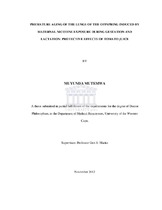| dc.description.abstract | exposed to nicotine through the blood and the milk of the mother. Nicotine is thus expected to interact with the developing fetus and the offspring of mothers who smoke or use NRT for smoking cessation, resulting in the interference with normal fetal and neonatal lung development. Maternal cigarette smoke or nicotine exposure produces adverse effects in the lungs of offspring, these include; intrauterine growth retardation, low birth weight, premature birth, reduced pulmonary function at birth, and a high occurrence of respiratory illnesses after birth. This study aimed at investigating the effects of maternal nicotine exposure during gestation and lactation on lung development in the offspring; to establish whether tomato juice can have protective effects on the fetal lung development and function in the offspring; and to determine if nicotine cases premature aging of the lungs of the offspring. It was therefore shown that maternal exposure to nicotine during gestation and lactation ad no significant effect on the growth parameters of the offspring. Maternal nicotine exposure during gestation and lactation had no effect on the growth parameters of the offspring, but resulted in compromised lung structure and function. The morphometric results demonstrated decrease in alveolar number, increase in alveolar size, and decrease in lung parenchyma of the nicotine exposed animals showing a gradual deterioration of the lung parenchyma. Structural alterations include emphysematous lesions, where the latter was accompanied by an increase in alveolar size (Lm), and a decrease in the tissue volume of the lung parenchyma. Thickening of alveolar walls was also evident and serves as an indication of remodeling of the extracellular matrix, also a characteristic of emphysema. A consequence of the gradual deterioration of the lung parenchyma is a decrease in the alveolar surface area available for gas exchange. The present study showed that the emphysematous lesions were conceivably a result of a reduced rate of cell proliferation accompanied by the increase in senescent cells numbers in the alveolar walls of the exposed offspring. The data of this study suggests that maternal nicotine exposure during gestation and lactation induces premature aging of the lungs of the offspring rendering the lungs of the offspring more susceptible to disease later in life. Since these structural changes occurred later in the life of the offspring and long after nicotine withdrawal, it is suggested that it is programmed during gestation and lactation. Smoking and NRT result in an increased load of oxidants in the mother and fetus. It also reduces the level of anti-oxidants and thereby compromising the ability of the mother to protect the fetus. It is hypothesized that this oxidant-antioxidant imbalance will program the lungs to age prematurely. The supplementation of the mother’s diet with tomato juice, rich in lycopene, other anti-oxidants such as vitamin C, as well as phytonutrients protected the lungs of the offspring against the adverse effects of maternal nicotine exposure. This supports the hypothesis mentioned above. The study further showed that the effects of grand-maternal nicotine exposure during gestation and lactation on the lungs of the F1 offspring is also transferred to the F2 offspring. This is most likely via the paternal and maternal germ line. Since tomato juice supplementation of the mother’s diet with tomato juice prevented the adverse effects of maternal nicotine exposure on the lungs of the offspring, it is conceivable that it will prevent transfer of these changes to the F2 generation. | en_US |

